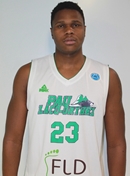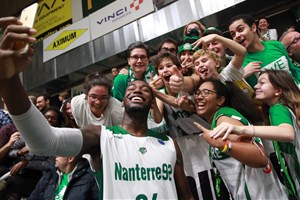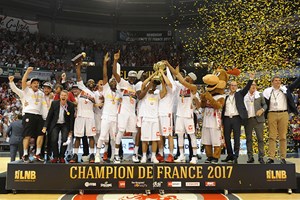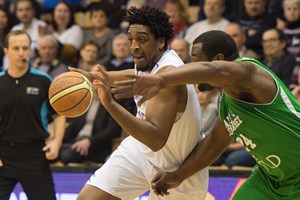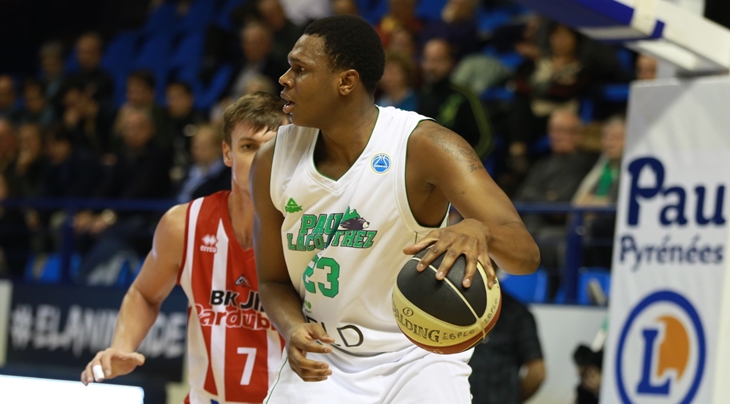
Outstanding Chikoko hoping to inspire new generation of Zimbabwean players
PAU (FIBA Europe Cup/FIBA AfroBasket 2017) – Zimbabwean basketball stand-out Vitalis Chikoko has continued to make progress in his professional career in Europe with a strong FIBA Europe Cup campaign for the iconic Elan Bearnais club in France.
Averaging a solid 11.0 points and 6.0 rebounds per game, the 25-year-old center has been a difference-maker for the French club inside the paint on both ends of the floor, but his 89.4% field goal conversation rate is what makes him stand out from the crowd.
Having missed five shots all season, the only thing preventing Chikoko from going into the record books might be the limited volume of attempts. It is for this reason that he doesn’t appear among the FIBA Europe Cup league leaders in field goal percentage.
We caught up with the Pau-Lacq-Orthez player to chat about basketball in Zimbabwe, the path of the big man’s career, as well as hopes and aspirations both for him and basketball in his homeland.
You are one of a few Zimbabwean basketball players in Europe. Can you tell us a bit more about your personal story and how you started to play basketball?
I used to play soccer, cricket and also some tennis, but most of my friends were playing basketball. I first started watching them play and one day the coach saw me and told me ‘you are tall; you should join the team’. I did and fell in love with the game.
Did you watch basketball when you were a kid?
I started watching basketball when I started playing the game of basketball. I wear the number 23 because of Michael Jordan (laughingly).
How is it to play basketball in a country where most of the people love soccer and cricket?
In Zimbabwe, there is a program for young kids called Hoops for Hope, so there are leagues from pre-school to High School. I was playing in one of these leagues and I fell in love with basketball quickly. I was good at school, but most of my time outside of school hours, I was playing basketball. My family was always very supportive and I thought that maybe I might be able to go to the NBA one day. I believed I can get there, so I started working hard every day. Then, I had the opportunity to come to Europe.
You said you choose to wear number 23 because of Michael Jordan. Who was the first player you enjoyed watching play when you were growing up?
Tim Duncan. I was a post player like him. When he was playing back then, he was amazing. He was doing everything: post up, shooting, everything. I was trying to play like him. And then there was also Michael Jordan. Everybody loved him. I loved watching him play too. When he finished his career, I went to Kobe (laughs). And when Kobe left, I went to Kevin Durant.
You left Zimbabwe in 2011 when you moved to Europe. How was it for you during that transition from Africa to Germany?
It was tough. For me, that was the first time being away from my family. But I got great support when I first moved to Europe. The players of the roster at Gottingen were young and just out of college. We had a good group of guys. We were going out together all the time, it was like family. It all got better progressively as Gottingen treated me like one of theirs. The staff and the people who were working for the team have always helped me, so it made my transition less tough.
Perfect night fuels Chikoko’s run to Top Performer honours https://t.co/LrHiZpZ1V5 #FIBAEuropeCup
— FIBAenDirect (@FIBAenDirect) December 16, 2016
What about adapting to the European style of play?
It was totally different. In Zimbabwe, I was one of the best players in the country, but in Europe, I was just a young kid playing among others. But I am a hard worker, I pay attention to small things, both on defense and on offense. I try to dunk the ball every time I am under the rim for example. I kept working hard with the coaches and it got easier for me to adapt to European basketball.
You played for Bayern Munich last season...
I wasn't expecting it. I was in Verona in the second division in Italy at that time and wasn't playing particularly well because the system was very different from what I was used to.
Bayern recruited me right before the halfway point of the season. I was so happy and thought it was my chance to move up a level. It was hard for me at the beginning but coach Svetislav Pesic helped me and liked me, so I got some regular playing time. I had a good first game, then a second one and then everything kept going well.
Now you represent Pau-Lacq-Orthez, one of the most iconic French teams. How is the transition going and how do you feel about playing in front of one of the most crowded arenas in the whole country?
I like to play in front of a lot of people, it motivates me more. I get extra energy too. Not that long ago, we played in front of 8,000 fans. That was just something amazing.
Vitalis Chikoko signs with Pau-Orthez: https://t.co/Ai86x6hhIa pic.twitter.com/7p4sElOoij
— Sportando (@Sportando) August 16, 2016
Elan Bearnais have had a great season in both Pro A and in the FIBA Europe Cup so far. What is the key of Pau's success this season?
I think it is because we have a great group of players. Everybody wants to achieve great things individually and we want to go to the next level. We have a lot of young players, but also guys who have so much experience like Alain Koffi and J.K Edwards. The rest of the guys, the youngest guys, have so much to prove. We are united and we don't want to lose at home. We want to win every game, but at home we always have extra energy.
What can we expect from Pau-Lacq-Orthez for the rest of the season?
Me personally, I want to win the championship. And I know that is how everybody feels, but the coach tells us to take the games one after the other. If we keep playing the way we have been doing, we can win the championship.
You have one of the best field goal shooting percentages in the FIBA Europe Cup. How do you feel about it? You only missed three shots since October in the continental competition…
I didn't even know that before my teammates told me about it. I was actually shocked! Every time I play, I try to be aggressive. I don't know what it is, but in the FIBA Europe Cup every time I go up, the ball goes in (laughs). As I said, I didn't even know about it until they told me. I just want to help my team win in the FIBA Europe Cup. I try to play hard and give everything I have in each and every game.
For you, it can be a very long season with the possibility of playing FIBA AfroBasket 2017 next summer. You played two years ago, but Zimbabwe lost every one of their games in the tournament. How important is it for you to play for the national team?
For me, it is not a tough decision to make. I actually like playing for the national team. I enjoy going back home and playing in international competitions makes me work on my game too, as there wouldn’t be that many coaches to work with individually otherwise. It is a chance to improve my game by being in competitive games situations. It’s going to be a good summer for me because I not going to be working by myself, I am going to play with my teammates and that is going to help me for the next season.
You had a pretty good tournament individually in Tunisia in 2015. What did you learn from that campaign?
It was an interesting experience for me. It was a bit tough because I was the only guy playing in Europe and the other players were playing back home, where we don't have a professional league. They were playing for fun. When you play against teams like Senegal or Nigeria, you've got to play with passion, be aggressive and try to be confident in yourself.
You can be an example of inspiration for young basketball players back in Zimbabwe. How do you feel about it?
It's very important for me because the kids back home look at me playing and 'want to be like Vitalis.' So I can't relax, I've got to keep motivating the youth. If I make it to the NBA one day, the whole country is going to be behind me. It is a motivation for me as well. That is my dream.
FIBA


